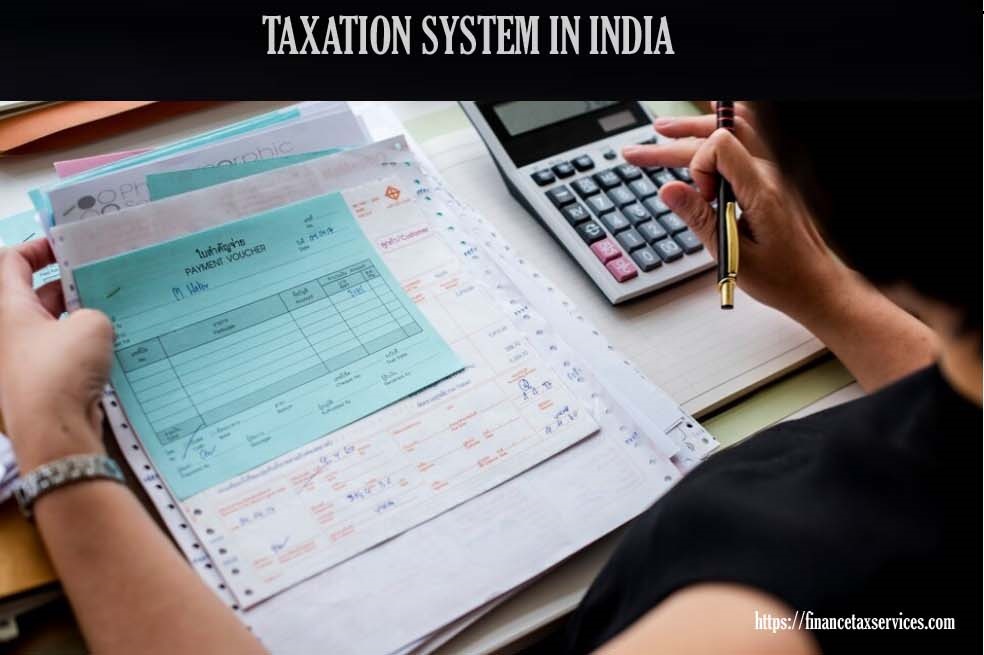
- 12 Sep 2024
- TAXFINN
- Tax services
- Comments: 1
TAXATION SYSTEM IN INDIA
INTRODUCTION
Taxes are levied by governments on their citizens to generate income for undertaking projects to boost the economy of the country and to raise the standard of living of its citizens. The authority of the government to levy tax in India is derived from the Constitution of India, which allocates the power to levy taxes to the Central and State governments. All taxes levied within India need to be backed by an accompanying law passed by the Parliament or the State Legislature.
- Introduction
- Direct Tax
- Indirect Tax
- Tax Filing and Compliance
- Tax Incentives and Exemptions
- Challenges and Reforms
- Impact of Taxation
- Wrapping Up
The taxation system in India is such that the taxes are levied by the Central Government and the State Governments. Some minor taxes are also levied by the local authorities such as the Municipality and the Local Governments.
To run the government and manage the affairs of a state, money is required. So the government imposes
taxes in many forms on the incomes of individuals and companies.
Taxation is a fundamental component of any country’s economic system. In India, taxes are crucial for financing government operations, infrastructure development, and social programs. India’s tax system is complex, comprising various types of taxes levied by both the central and state governments. This article provides an in-depth overview of the tax system in India, including its types, structure, and impact on individuals and businesses.
OVERVIEW OF THE INDIAN TAX SYSTEM
India’s tax system is a combination of direct and indirect taxes, governed by both central and state authorities. The Constitution of India divides the powers to levy taxes between the central and state governments, ensuring a balanced distribution of revenue sources.
Direct taxes are those paid directly to the government by individuals and organizations. These taxes are based on the income or wealth of the taxpayer.
Direct taxes are imposed on the basis of individuals ability to pay principle, which says that those individuals or entities having access to more resources and earning a higher income need to pay higher taxes.
The direct rules are framed such that taxes turn out to be a method to redistribute money in the country.
Direct taxes are transferable to another person or organisation. The companies and individuals on whom the direct taxes are applied are solely responsible for paying the taxes. Failure to pay taxes on time may result in fines and imprisonments.
Direct tax system, based on the brackets system, may turn out to be discouraging as it imposes higher taxes on those working hard to earn a higher income. Hence, people, with the view of needing to pay higher taxes, may settle and cap their productivity to reduce their outgo.
Indirect taxes are another form of taxes that are indirectly imposed on individuals when they make transactions on goods and services.
Indirect taxes are collected from retail and wholesale dealers on a periodic basis.
The primary direct taxes in India include:
- Income Tax: This is a tax on the income earned by individuals, businesses, and other entities. The Income Tax Act, 1961, governs the income tax regulations in India. Taxpayers are classified into different categories, including individuals, Hindu Undivided Families (HUFs), firms, companies, and trusts. The tax rates and slabs vary depending on the category and the amount of income.
- Corporate Tax: Corporate tax is levied on the profits earned by companies. In India, companies are categorized into domestic and foreign companies, with different tax rates applicable to each. The Companies Act, 2013, and the Income Tax Act, 1961, outline the regulations concerning corporate tax.
- Wealth Tax: Historically, wealth tax was imposed on the net wealth of individuals, HUFs, and companies. However, this tax was abolished in 2015 and replaced by the concept of the “Additional Income Tax” on high-income earners in the form of a surcharge.
- Securities Transaction Tax (STT): This tax is applicable to transactions involving the purchase and sale of securities listed on recognized stock exchanges. It aims to tax the gains from trading in securities.
- Capital Gains Tax: This tax is levied on the profits earned from the sale of capital assets such as real estate, stocks, and bonds. Capital gains can be classified into short-term and long-term, with different tax rates applicable to each.
- Gift Tax: In 1958, the Gift Tax Act was originally introduced. According to the act, if you receive presents of any kind, then you will have to pay a tax of 30%. This was later tweaked to exclude gifts from family such as spouse, parents and blood relatives. If anyone else gives a gift whose value exceeds Rs. 50000, then you will have to pay tax.
Indirect taxes are levied on goods and services rather than on income or wealth. The key indirect taxes in India include:
Tax Administration
The administration and enforcement of taxes in India are managed by various government agencies and departments:
- Income Tax Filing: Individuals and entities are required to file annual income tax returns, declaring their income and claiming deductions or exemptions as applicable. The Income Tax Department provides various forms for filing returns, and the process can be done online or offline.
- Corporate Tax Filing: Companies must file annual tax returns, including financial statements and tax calculations. They are also required to undergo statutory audits to ensure compliance with tax regulations.
- GST Compliance: Businesses registered under GST must file periodic GST returns, including details of sales, purchases, and tax paid. The GST compliance process includes the generation of GST invoices, maintenance of records, and timely payment of taxes.
- Customs Duty Compliance: Importers and exporters must adhere to customs regulations, including the filing of import or export declarations, payment of customs duties, and compliance with trade regulations.
Tax Incentives and Exemptions
The Indian tax system provides various incentives and exemptions to encourage investment, savings, and economic growth. Some notable tax incentives include:
- Deductions and Exemptions: Taxpayers can claim deductions for expenses such as interest on home loans, contributions to retirement funds, and medical insurance premiums. Certain income sources, like agricultural income, are exempt from tax.
- Tax Incentives for Investments: The government offers tax benefits for investments in specific sectors, such as infrastructure, startups, and renewable energy. For instance, investments in specified bonds or schemes may qualify for tax deductions under Section 80C of the Income Tax Act.
- Special Tax Regimes: Certain sectors or regions benefit from special tax regimes. For example, Special Economic Zones (SEZs) offer tax exemptions to promote exports and economic development in designated areas.
- Tax Holiday Schemes: Some industries and regions receive tax holiday schemes, where they are exempt from paying taxes for a specific period to encourage investment and development.
India’s tax system faces several challenges, including tax evasion, complexity, and compliance issues. To address these challenges, the government has implemented various reforms:
1.Digitalization: The government has increasingly moved towards digital platforms for tax filing, payment, and compliance. The introduction of the Goods and Services Tax Network (GSTN) has streamlined GST compliance, while e-filing systems for income tax returns have improved efficiency.
2. Anti-Evasion Measures: Measures such as the implementation of the Goods and Services Tax, stricter enforcement of tax regulations, and the introduction of the Income Tax Act’s Section 194-IA (tax on immovable property) aim to reduce tax evasion and increase transparency.
3. Simplification: Efforts to simplify the tax system include the consolidation of multiple indirect taxes into GST and the introduction of a simplified tax return filing system for small taxpayers.
4. International Cooperation: India has engaged in international cooperation to combat tax evasion, including agreements for the exchange of tax-related information with other countries.
1. Economic Development: Taxes fund government projects and infrastructure, driving economic growth and development. Investments in sectors like education, healthcare, and transportation are largely financed through tax revenue.
2. Social Welfare: Taxes support social welfare programs, including subsidies, social security, and poverty alleviation initiatives. They contribute to improving the quality of life for citizens and addressing social inequalities.
3. Business Environment: The tax system influences the business environment, affecting investment decisions and economic activities. A well-structured tax system can attract foreign investment and foster a competitive business climate.
4. Public Services: Taxes enable the provision of essential public services, such as law enforcement, public health, and education. They play a vital role in maintaining the functionality and efficiency of public institutions.
India’s tax system is a multifaceted framework designed to support the country’s economic and social objectives. With a mix of
direct and indirect taxes, the system is managed by both central and state authorities, ensuring a balanced approach to revenue generation. While the tax system has undergone significant reforms to enhance efficiency and compliance, ongoing challenges remain. Understanding the complexities of taxation in India is crucial for individuals, businesses, and policymakers alike, as it shapes the country’s economic future and impacts the lives of its citizens.
If you still have any question, feel free to ask me via comments or via email.
Don`t forget to share what you like here on Instagram, Facebook with your friends and family.
In this article I try to explain about Taxation system in India and importance of taxation system. And
Financetaxservices.com is here to
GST Services, file
Income Tax retun filing, Pan card services, Trademark services,
MSME registeration services as your trusted company.
We at
FINANCETAXSERVICES.COM set you up in the GST regime effectively and reliably. Just sent your documents on our email/whatsapp by giving the required details and documents and that’s all you need to do. We will do the registration for you. Being the GST consultant across the nation, we understand the trouble aspiring business owners and suppliers facing and hence works intending to provide high-quality services for all the needy ones. Email us on taxandfinanceservice@yahoo.com now and we would be happy to assist you!
Article Written by:
Financetaxservices.com is an ITR, GST AND Finance management Platform helping businesses for finance and tax related services. For any query, please email us : taxandfinanceservice@yahoo.com visit: https://financetaxservices.com/

Thanks for information